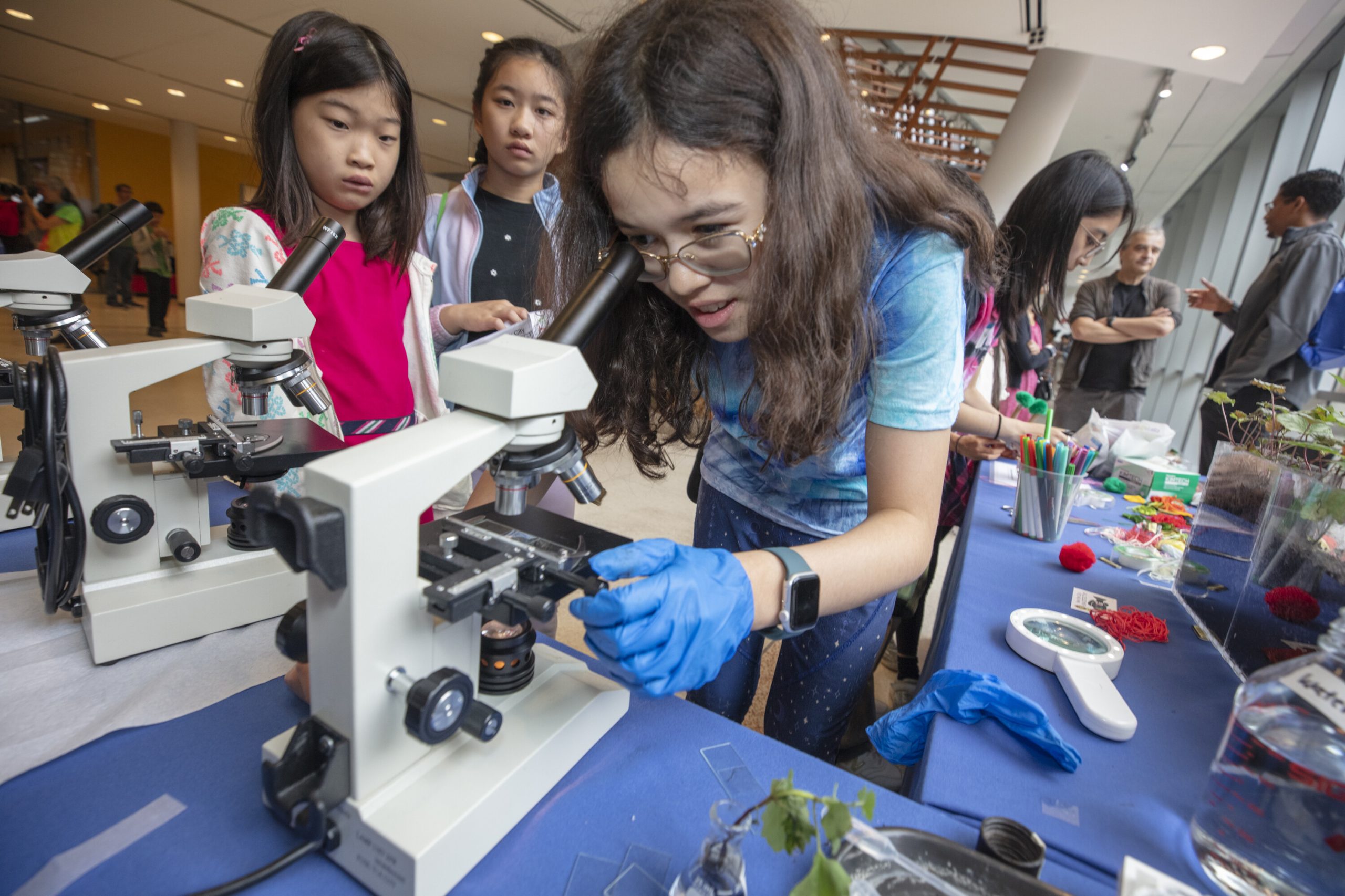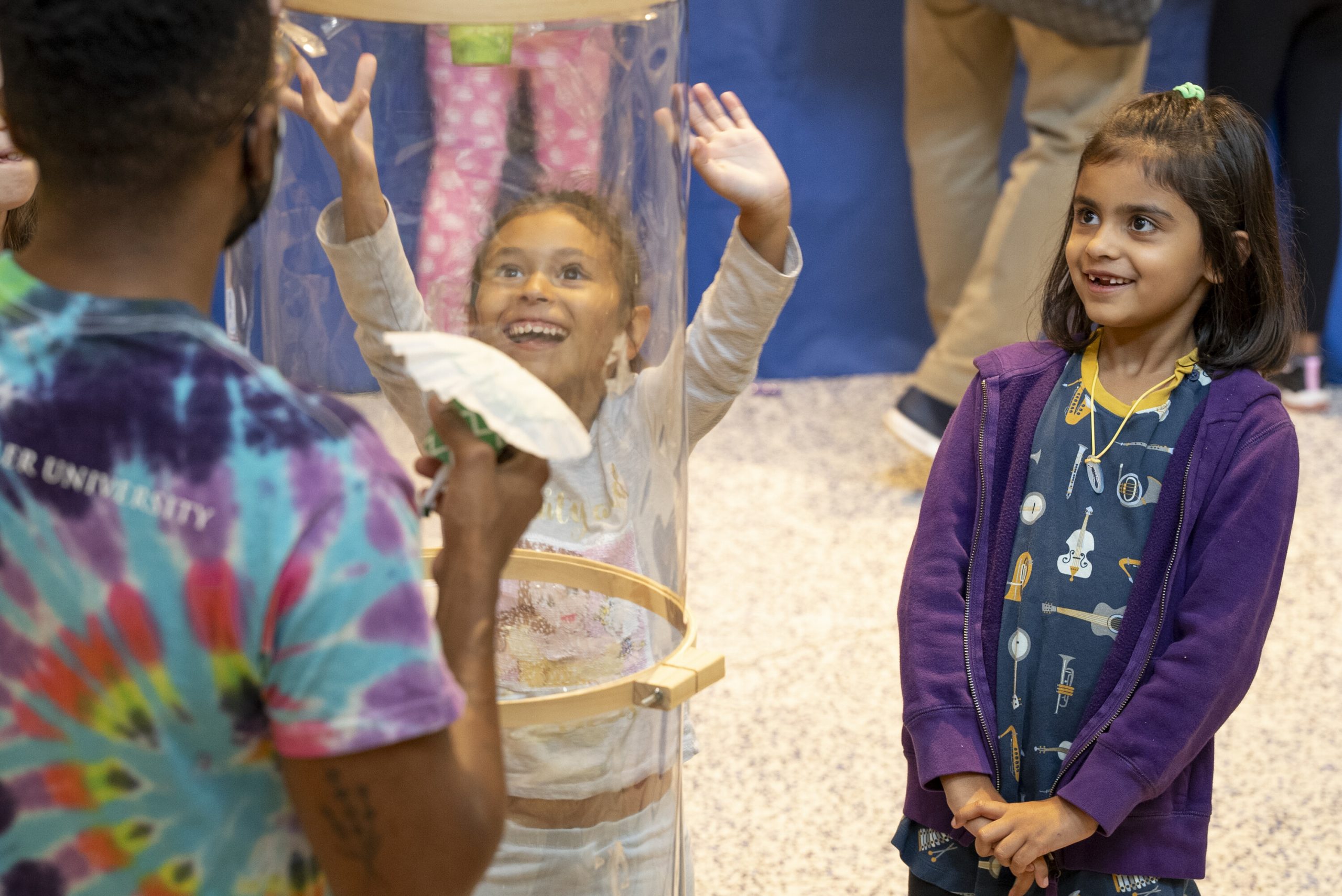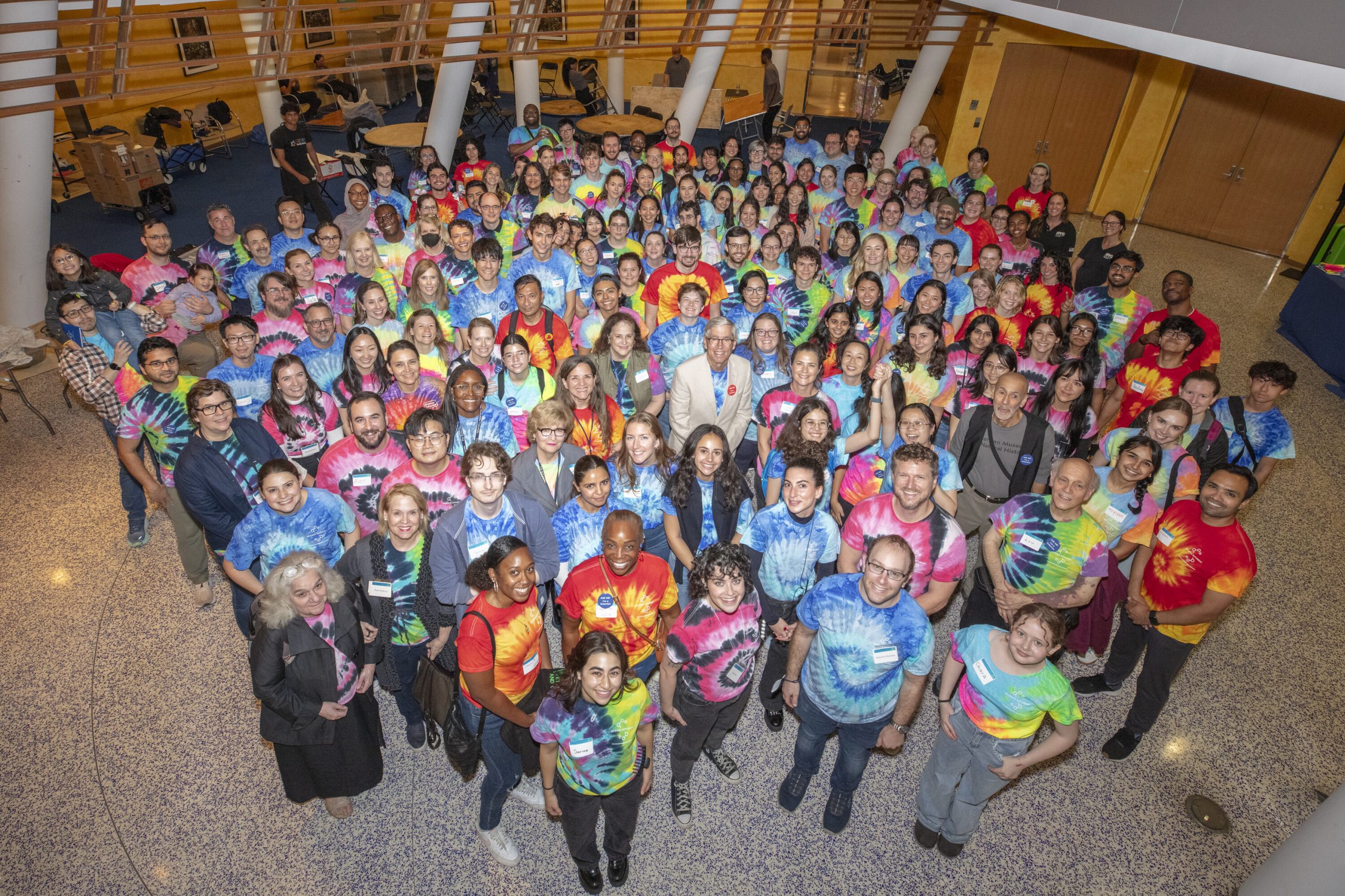On September 28, the tenth annual Science Saturday STEM festival brought together students, educators, volunteers, and families for a day to celebrate the wonders of science. Hosted by Rockefeller University’s RockEDU Science Outreach department, the festival again demonstrated how science can be a powerful connector across generations, disciplines, and communities. With over 800 attendees, the event left a lasting mark on participants from all five NYC boroughs and beyond, extending to New Jersey, Connecticut, and Massachusetts.
Science Saturday has become a hallmark of Rockefeller’s commitment to public outreach. The goals of Science Saturday are twofold: while the event aims to inspire and engage young learners through hands-on STEM experiences, it also serves as a valuable platform for volunteers to hone their science communication skills, build community connections, and share their passion for discovery. As Dr. Jeanne Garbarino, Executive Director of RockEDU, explains, Science Saturday is there “to provide scientists with a platform to transform their educational ideas about science into reality. There can be few opportunities to engage in outreach; this is a low-barrier-to-entry space for scientists to give it a go!” She adds, “For all of the kids who attend the event, we hope that they connect ‘science’ with lots of different things and lots of different kinds of people.”
Learning Through Play
Science Saturday featured thirty-five hands-on learning stations, designed to engage attendees with activities ranging from biology to physics. The variety of stations ensured that science felt approachable and fun for children of all ages. Rockefeller University researchers showcased projects like Protein Party People, where kids discovered fluorescent proteins under a microscope and crafted colorful friendship bracelets based on their amino acid sequences. In the Brainscape, students compared animal brains and even got to dissect a sheep’s brain. The Tri-I team from MSK delighted young visitors with a mini-golf game that explored how molecules move within cells. RockEDU’s stations included the popular Fermi Questions challenge, where kids estimated the number of sweets in a jar and left with candy-covered smiles.

The stations were designed to foster communication skills and present science as an accessible, everyday endeavor. Volunteers evolved their science communication skills in real time. By the end of the day, they were pros at explaining complex topics to curious kids.
Making the magic happen
Pulling off an event of this scale requires meticulous planning and coordination to ensure that every detail is in place. It’s a behind-the-scenes effort months in the making, from managing volunteers to organizing supplies and working closely with partners. Garbarino highlighted, “We are very big on not having stuff feel urgent; we want our volunteers to want to come back to us. So mapping it out over approximately 14 weeks of active planning has tended to help us strike a good balance. We keep pretty zen, and I am proud of that!”
RockEDU also collaborates with Rockefeller’s Development Office to plan the logistics for the day. “They are essential for making the day run so smoothly,” said Dr. Jessi Hersh, RockEDU’s Program Manager for Student Engagement. “They not only handle the majority of the planning, they also help a lot with fixing our mistakes. That plus the 500 emails we send leading up to the event generally make sure everything occurs smoothly.”
Organizing an event of this scale also requires a bit of humor. Garbarino recalls one particularly memorable moment from a past Science Saturday when they shattered a window in the facade of the Collaborative Research Center. It was an ambitious attempt to build a Rube Goldberg machine across the five floors of the CRC. But the magnet they launched went in the wrong direction and straight into the window. While it caused some panic initially, it is now part of the event’s lore. “It was a paralyzing moment for all of us—part thankful that no one got hurt, and part scared that we were all getting fired!”
A Festival Rooted in Community
The 2024 edition was the largest yet, featuring 170 volunteers—a community in itself. “The event is so well known that many individuals already plan to volunteer a year in advance,” Hersh said. “About half of our volunteers are from Rockefeller, a quarter are from Tri-I or are other community members, and the rest are our community partners.”
Thirteen community partners participated in the 2024 festival. There were stations by the Intrepid Museum, the NYC Department of Transportation, the Queens Botanical Garden, and Astor Apiaries, just to name a few. RockEDU’s collaboration with the New York Public Library (NYPL) extended even further: NYPL gave out fifty new library cards, and a new partnership with the library is already in development. Hersh reflected on the event’s impact, saying, “It’s been wonderful to see how woven Science Saturday is within the NYC STEM community.”
What made this year particularly special was the group of thirteen “legacy” volunteers—former Science Saturday attendees who returned, now old enough to run stations themselves. Hersh commented on this intergenerational engagement: “We take great pride in the fact that students enjoyed attending the event so much when they were in K-8 that they wanted to remain involved once they ‘aged out’ and reached high school. It demonstrates the impact Science Saturday has had on these students as well as just how long Science Saturday has been occurring.”
Lia Skarabot, a sophomore at The Bronx High School of Science, grew up attending Science Saturday and is now a returning Science Saturday volunteer. “When I got the invite to volunteer at Science Saturday, I was ecstatic,” Skarabot said. Skarabot was leading a new station on mycorrhizal networks this year, inspired by a talk that Dr. Suzanne Simard gave at Rockefeller University. “Teaching kids at Science Saturday has been very rewarding. I will never forget the wide-eyed interest on some of their faces, […] reminding me of how I was when I was their age,” Skarabot said. “Science Saturday has been an amazing experience for me, and I can’t wait to do it again next year.”
The Power of Meaningful Engagement
RockEDU’s backbone of success has always been about developing and nurturing genuine connections with people. “We understand that the ‘spark’ can be so fragile,” Garbarino said. “We want to do our best to help nurture that tiny light into a bonfire of independence and resilience. It is rare that we ever tell someone ‘no.’ So when we have students who come to us with enthusiasm and ideas, we do our best to make it happen with them. We focus on mentorship and we focus on people. I think this is why it works.”
Students from RockEDU’s other educational programs, such as LAB Jumpstart and the Summer Science Research Program (SSRP), reliably return to participate in Science Saturday. “I believe our students connect deeply with the ‘humanity’ piece of ‘science for the benefit of humanity’,” Garbarino said. “They can experience what it is like to be mentored when they are with us, and I think this inspires many to want to do this as a ‘paying it forward’ activity.” “The RockEDU alumni are often our most versatile volunteers,” Hersh said. “They bring so much enthusiasm to the event, and their positive energy reflects RockEDU well for attendees.”
One of the RockEDU Scholars shared in their volunteer reflection, “Growing up, my parents never took me to events like this, so when I saw how happy the kids were with their parents, it felt really heartwarming. I think it gave everyone a sense of pride in their work and the impact they made, even with something as simple as helping kids count pieces of tape. It’s rewarding to know you’re helping these kids at the start of their journey.”

The Future of Science Saturday: A Legacy of Impact
Whether it’s a child discovering their passion for insects at the ANTventure station or a volunteer gaining confidence in teaching, the festival leaves an indelible mark on everyone involved. As one parent put it in the feedback form: “My daughter and I are repeat visitors. I can’t believe my good fortune in discovering Science Saturday a few years ago. What a treasure: everyone was so pleasant and helpful and the grad students/fellows were so wonderful in conveying their enthusiasm for their research to the kids. My daughter looks forward to it every year and still talks about some of the things she learned.”
The success of the festival isn’t just measured in numbers but also in the connections it fosters. “For us, success can be a bit qualitative and linked to emotions,” Garbarino said. “Did we help solidify the possibility of a scientific career for a young person? Is a kid more likely to think about science and scientists in a positive light?”
Garbarino also regards new partnerships and collaborations as a metric of success, and continues to develop and grow new relationships in NYC and beyond. “We are looking to elevate the familiarity of Rockefeller and RockEDU with our surrounding communities,” she said. “We are also obsessed with NYC infrastructure so we are already developing a strategy for getting these relationships ready for next year (fingers crossed we get NYC Sanitation!).”
In collaboration with Rockefeller’s Development Office, RockEDU is also working on engaging more kid-serving nonprofit communities around the city. Additionally, many teachers attending the festival are inspired to integrate what they’ve learned at Science Saturday into their curricula. “It’s common for us to just give them all of our leftover materials for that station as a donation,” Garbarino said.
With a decade of success behind it and many more to come, Science Saturday is more than an event—it’s a tradition, a spark, and a reminder that science belongs to all of us.
Photographs credit: copyright of Matthew Septimus


